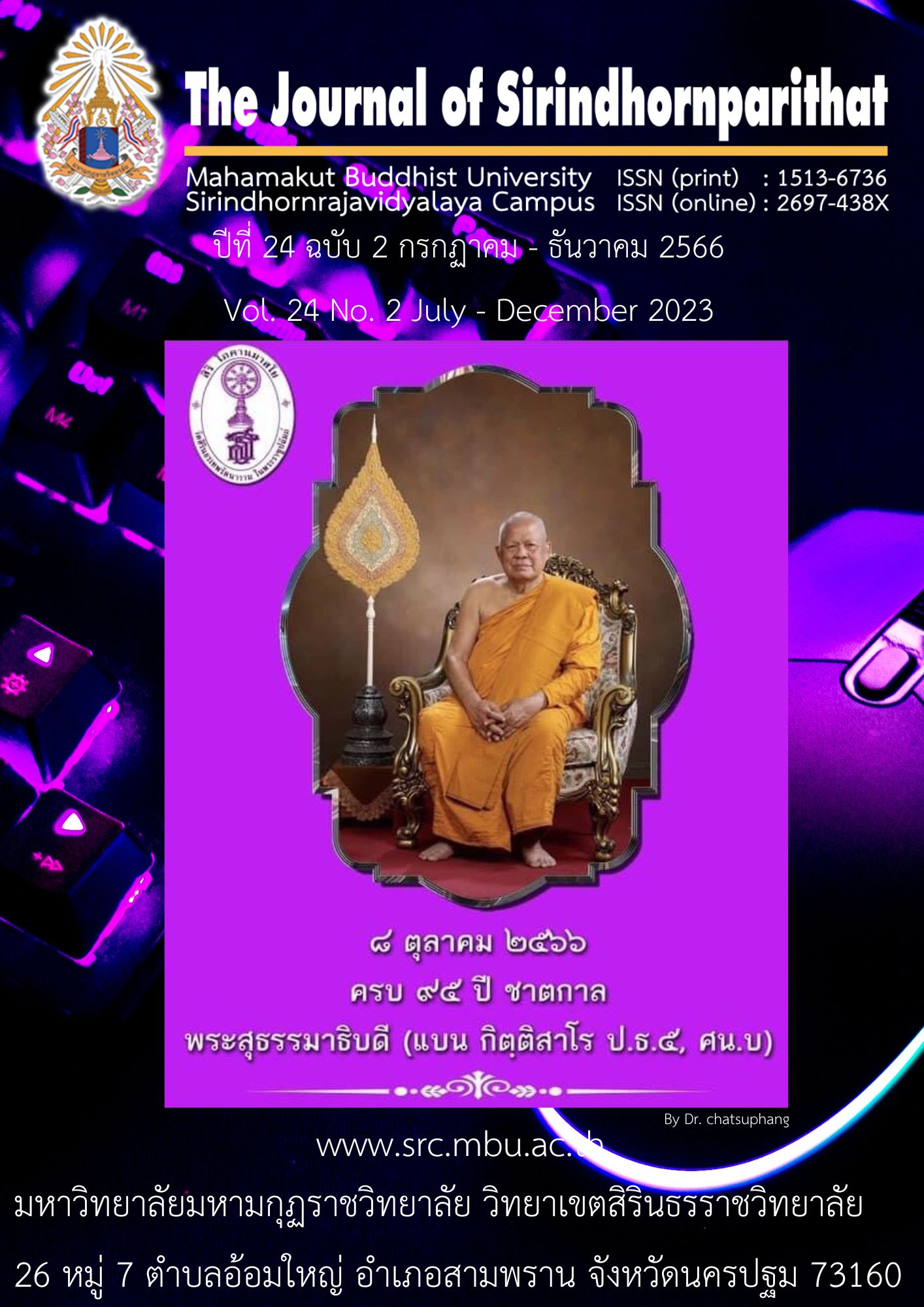Thai Efl Primary Students’ Voice on English Online Learning in The New Normal Period
Keywords:
online learning, needs, problems, new normal periodAbstract
This study aims to investigate Thai EFL students’ needs and problems on English online learning in the new normal situation. The participants are 50 Thai EFL primary students, who have experienced English online learning in the first semester of academic year 2021, from an opportunity expansion school in Thailand. A questionnaire was utilized as a main instrument to obtain students’ needs and problems. The data was analyzed by using Mean and Standard Deviations. The results showed that the majority of students required needs and faced problems during an English online learning. The findings on students’ needs revealed that majority of them highest needed more explanation from teacher. According to the problems that students faced during an English online class, students mainly agreed that they were unsure if their English pronunciation was correcta. The concluding remarks suggested teacher to fulfill students’ needs and prevent problems that may occur in English online learning.
References
Alexander, M. W., Truell, A. D., & Zhao, J. J. (2012). Expected advantages and disadvantages of online learning: Perceptions from college students who have not taken online courses. Issues in Information Systems, 13(2): 193-200.
Ally, M. (2011). Foundation of educational theory for online learning. Anderson, T., The theory and practice of online learning . Edmonton, Canada: AU Press.
Bangkok Post. (2021). Schools free to decided how to teach in new term. Retrieved August 30, 2021, from https://www.bangkokpost.com/thailand/general/2111347 /schools-free-to-decide-how-to-teach-in-new-term.
Burns, A., & Richards, J. C. (Eds.). (2009). Cambridge guide to second language teacher education. ProQuest Ebook Central https://www.proquest.com
Buzzetto-More, N. (2008). Student perceptions of various e-learning components. Interdisciplinary Journal of E-Learning and Learning Objects, 4(1): 113-135.
Destianingsih, A., & Satria, A. (2020). Investigating students’ needs for effective English online learning during Covid-19 for Polbeng students. ELT-Lectura, 7(2): 147-153.
Farrah, M. & Al-Bakry, G. H. (2020). Online learning for EFL students in Palestinian universities during corona pandemic: Advantages, challenges and solutions. Indonesian Journal of Learning and Instruction, 3(2): 65-78. DOI:
https://doi.org/10.25134/ijli.v3i2.3677
Goundar, S. (2014). The distraction of technology in the classroom. Journal of Education & Human Development, 3(1): 211-229.
Graham, C. C. (1869). What is perception? In C. C. Graham, The true philosophy of mind. Unknown Publisher. https://doi.org/10.1037/14122-005
Imsa-ard, P. (2020). Thai university students’ perceptions towards the abrupt transition to “forced” online learning in the covid-19 situation. Journal of Education Khon Kaen University, 43(3): 30-44.
Lim, C. P. (2004). Engaging learners in online learning environments. TechTrends, 48(4): 16-23.
Marsom, M. (2007). Technology acceptance model and e-learning. Technology, 21(4): 81.
Mahyoob, M. (2020). Challenges of e-Learning during the COVID-19 Pandemic Experienced by EFL Learners. Arab World English Journal (AWEJ), 11(4).
Nambiar, D. (2020). The impact of online learning during COVID-19: students’ and teachers’ perspective. The International Journal of Indian Psychology, 8(2): 783-793.
Nartiningrum, N., & Nugroho, A. (2020). Online learning amidst global pandemic: EFL students’ challenges, suggestions, and needed materials. ENGLISH FRANCA: Academic Journal of English Language and Education, 4(2): 115-140.
Nation, I. S. P. & Macalister, J., (2010). Language Curriculum Design. New York &. London: Routledge.
Oliver, R., & Herrington, J. (2001). Teaching and learning online a beginner’s guide to e-learning and e-teaching in higher education. Mt Lawley, Western Australia: Edith Cowan University
Oraif, I., & Elyas, T. (2021). The Impact of COVID-19 on Learning: Investigating EFL Learners’ Engagement in Online Courses in Saudi Arabia. Educ. Sci. 11(3), 99. https://doi.org/10.3390/educsci11030099Benefit of online Learning
Qiong, O. U. (2017). A brief introduction to perception. Studies in Literature and Language, 15(4): 18-28.
Reisetter, M., & Boris, G. (2004). What works: Student perceptions of effective elements in online learning. Quarterly Review of Distance Education, 5(4): 277-291.
Sukman, K., & Mhunkongdee, T. (2021). Thai EFL learners’ Voices on Learning English Online during the COVID-19 Pandemic. SSRN Electronic Journal, 9(2): 1-9. doi:10.2139/ssrn.3824069
UNESCO. (2021, July 8). Education: From disruption to recovery. https://en.unesco.org/ covid19/educationresponse#schoolclosures
Wang, M., Ran, W., Liao, J., & Yang, S. J. (2010). A performance-oriented approach to e-learning in the workplace. Journal of Educational Technology & Society, 13(4): 167-179.
World Health Organization. (2020). Coronavirus. World Health Organization. https://www.who.int/health-topics/coronavirus#tab=tab_1.
Yuh, A. H., & Kaewurai, W. (2021). An Investigation of Thai Students’ English-speaking Problems and Needs and the Implementation Collaborative and Communicative Approaches to Enhance Students’ English-speaking skills. The Golden Teak: Humanity and Social Science Journal, 27(2): 91-107.

Downloads
Published
Issue
Section
License
Copyright (c) 2023 Mahamakut Buddhist University

This work is licensed under a Creative Commons Attribution-NonCommercial-NoDerivatives 4.0 International License.
บทความที่ได้รับการตีพิมพ์เป็นลิขสิทธิ์ของ มหาวิทยาลัยมหามกุฏราชวิทยาลัย วิทยาเขตสิรินธรราชวิทยาลัย
ข้อความที่ปรากฏในบทความแต่ละเรื่องในวารสารวิชาการเล่มนี้เป็นความคิดเห็นส่วนตัวของผู้เขียนแต่ละท่านไม่เกี่ยวข้องกับหาวิทยาลัยมหามกุฏราชวิทยาลัย วิทยาเขตสิรินธรราชวิทยาลัย และคณาจารย์ท่านอื่นๆในมหาวิทยาลัยฯ แต่อย่างใด ความรับผิดชอบองค์ประกอบทั้งหมดของบทความแต่ละเรื่องเป็นของผู้เขียนแต่ละท่าน หากมีความผิดพลาดใดๆ ผู้เขียนแต่ละท่านจะรับผิดชอบบทความของตนเองแต่ผู้เดียว



